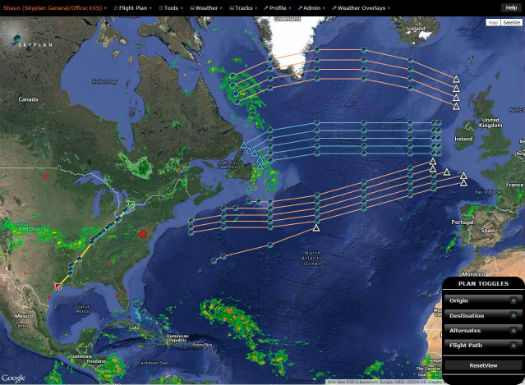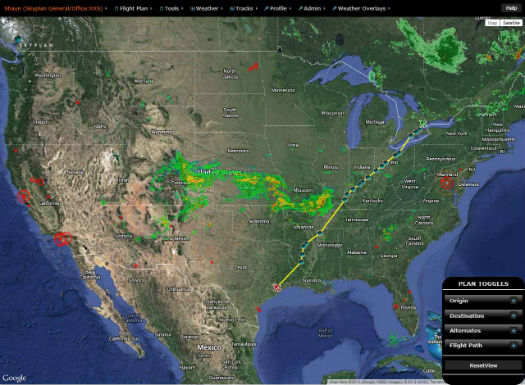Skyplan made a name for itself providing flight operations services to the global cargo aircraft market. Crews liked the around-the-clock services provided by the Calgary-based company. Simon Blakesley Photo
In June 2002, when Air North launched its Boeing 737 service between Whitehorse and Vancouver, Calgary and Edmonton, the airline’s first choice for dispatching and flight planning services was Skyplan Services, Limited (Skyplan). “They offered efficiencies of service that we would not have been able to match,” explained Allan Moore, chief operating officer and director of airports and operational performance at Air North. The arrangement has worked out so well over the years that “we’re planning to transition our northern turboprop operations to Skyplan dispatching as well.”
Skyplan seemed a natural choice because it offered one-stop shopping for small- to medium-sized private, corporate or commercial operators—services include everything from flight planning to NOTAMs to flight following.
Skyplan dispatchers act as a flight operations department, dispatching a flight from start to finish. Skyplan Photo
Back in 1983, the initial vision for the company was to support corporate aviation in Calgary during the oil patch’s boom years. Adrian Bone, Skyplan’s affable president and co-owner, remembers receiving a call “from a fellow in Calgary asking if I wanted to come down and start this new organization with him.” At the time, Bone was working for NWT Air on Hercules cargo transports, and he jumped at the chance. “There was a two-year build, and our doors opened on July 1, 1985.”
His excitement was somewhat tempered, however, when Canada’s National Energy Program and plummeting world crude prices put a serious damper on the oil and gas business. Skyplan needed to adapt in short order—which it did, setting the tone for a level of versatility that has been a hallmark of the company’s 30-year success story. It didn’t take long to find a new focus.
“What we found was a niche market on the global cargo aircraft side,” recalled Bone. “At that time, it was 707s, DC8s and some Hercs on the commercial side. We discovered most of the cargo carriers were small, anywhere from one to four large aircraft, operating internationally.” Soon, their main clientele was a collection of mostly South American, European and Russian cargo carriers.
The Skyplan sales team meets in the company’s Calgary boardroom. Skyplan Photo
It was a perfect fit, especially for Skyplan’s flight planning services. “What the carriers lacked was a solid flight operations department on a 24/7 basis that could connect globally and provide the services they required,” explained Bone. “(This included) overflight permits, handlers, hotels, peripheral services the crew needed on the ground, plus the actual flight data.” Skyplan fit the bill for pilots who were receiving routing instructions on the go, and Bone noted that crews liked the service because of the around-the-clock operations. “They didn’t have to rely on someone on the ground at home base who really didn’t know where he was half the time,” he said.
Those were the days before cell phone use was common, and Skyplan relied on telex communication, which wasn’t always easy. Craig Mariacci, Skyplan’s vice president of sales and co-owner—who joined the company in 1988 after working with Dome Petroleum’s Beaufort Sea flight ops—recalls one African client who used a radio telephone to communicate with Skyplan’s telex. “We’d have to run their flight plan and then put it on tape,” he remembered. “It was brutal, a two-hour process.”
Many of Skyplan’s customers were flying cattle or equipment into Africa and the Middle East, where little flight support had yet developed. The operators were attracted to the services Skyplan offered because it helped them with on-time scheduling, which allowed them to appear more professional in their marketplace—a Skyplan advantage that users enjoy to this day. “Their clients would phone us and say: ‘Where is the aircraft, three hours out or on the ground?’” said Bone. “Everybody could contact Skyplan and determine where the aircraft was, what it was doing, where it was going next—it really set us up in this business.”
All the company’s dispatchers are licensed by Transport Canada on three to five carriers, with whom they do annual “fam” flights. Skyplan Photo
The next big opportunity came with the Gulf War, supporting American and Canadian cargo carriers that were re-supplying the troops for Operation Desert Storm. Much of that involved working through a multitude of government agencies to cover off critical overflight and landing clearances. Overflying most of the Middle East countries in a war zone presented its share of challenges.
With airline deregulation in the early 1990s, a new niche was quickly seized upon. “About seven new airlines started up and I think we did six of those,” said Bone. These startups had anywhere from two to six airplanes and were too small to have their own flight operations, so Skyplan handled their dispatching. One of their first customers during that era was WestJet—in fact, Skyplan handled the airline’s first two years of dispatch. “When we signed the contract there were a total of four people at WestJet,” recalled Bone.
Around this time, the cargo market began to decline. “The price of fuel went so high after the Gulf War that if you operated a four-engine aircraft, you were out of luck,” said Mariacci. Widebodies, cheaper on fuel, were coming online and belly space was wiping out the 707/DC-8 era. The cargo side disappeared by the mid to late 1990s, forcing Skyplan to reinvent itself once again. “We picked up more corporate activity and more of the passenger airline activity; and a lot of the ferry companies,” said Bone. “We really diversified.”
A key to maintaining the company’s flexibility over the decades was buying and enhancing its own flight planning system. Skyplan Image
Worldwide, small cargo operators are still a mainstay, particularly where flight planning support is minimal. For example, “If they’re at an airport which doesn’t take a flight plan, we file with the different FIRs [ICAO Flight Information Regions] and the pilot would leave a flight plan with the person on the ground at the airport,” Bone explained.
Even at the larger airports, Skyplan delivers convenience. The service provides crews with the complete flight plan prior to their arrival at the airport. “A crew could be sitting in a hotel, we could send our package to the hotel, and over breakfast they can go over the flight plan,” said Bone. Skyplan then files that plan with the tower. All the crew needs to do is plug in the coordinates and call the tower; clearance is already there.
Skyplan had been issuing flight plans through a third party but the company purchased its own system in 1992, which helped accelerate the business. Its evolutionary development has been entirely client-led ever since. “They’ve helped us grow; clients are an integral part,” noted Mariacci. The company claims to be the first in the industry to use the Internet for flight planning, shaving hours off the process. “Before computers, it would take hours to do a transatlantic flight plan through a dispatcher,” he said. “Now, we do that in seconds.”
Skyplan’s flight panning system enabled the company to introduce other complementary peripheral services. Skyplan Image
Services and Options
Skyplan offers two options in their flight planning system: hosted or full dispatch. The hosted option allows clients to go online to obtain weather, NOTAMs, etc., to put their own package together. Alternatively, Skyplan dispatchers act as a flight operations department and dispatch a flight from start to finish. All the company’s dispatchers are licensed by Transport Canada on three to five carriers, with whom they do annual “fam” flights. Third-party dispatching suits airlines like Air North: “As an airline with nearly 500 employees and 10 aircraft in our fleet, Skyplan gives us incredible cost-effectiveness relative to our size,” said Air North’s Moore.
Sometimes the service could be called “above and beyond the call of duty.” One client pilot was ferrying an airplane to the Middle East via Frobisher Bay, Nunavut. Some hours into the first leg, he realized he’d forgotten his passport. No problem: he called Skyplan, which sent an employee to the pilot’s house to retrieve the passport. It was couriered to Frobisher, arriving before their morning departure. “That pilot has been a customer of ours now through three different airlines,” said Bone.
Over the decades, Skyplan has operated offices throughout the world, in Moscow, Toronto, London and Bangkok—that is, until the Internet changed everything.
Now, the only overseas office is in Dubai. It is managed by the company’s third co-owner, Muhammed Sami. “We knew a lot of people over there from the Gulf War operations,” said Bone. “We found Dubai gave us a good, solid African, Middle East and Far East connection.” It complements Calgary, which is close to the U.S. and South America.
Employing around 40 people, Skyplan has operated 24/7 since 1986. Moreover, with a culturally diverse staff, the company offer a wide range of languages to clients whose first language is not English.
Skyplan’s new Aurora flight planning system is web-based, meaning no downloading is required. All clients need to access the system is a computer and a password. Simon Blakesley Photo
After 30 years in business, Skyplan is obviously doing something right. “We have our ups and downs, our good years and our bad years,” said Bone. “One thing we have maintained for the last 14 years is no debt. We diversify. And, our biggest investment has always been our people and our technology. To us, that is most important.” Technology enables the company to keep up with rapidly changing rules. “If you get, for example, government regulation changes anywhere in the world, it may affect our flight planning engine. We are constantly stepping ahead of those,” he added. The other secret to the company’s success is that it strives to deliver top-notch customer service, while soliciting client feedback that is used to drive Skyplan’s next product line enhancement.
Because Skyplan is global, world political events impact what the company does—from Ebola to Icelandic volcanoes to the Russians’ latest moves. “Our international planning group deals with 30 or 40 countries, so they have to know what is going on,” said Bone. That includes economic trends, like in 2007 and 2008 when companies were getting rid of their corporate jets. “When the economy goes up and down different markets go up and down, too.”
A key to maintaining the company’s flexibility over the decades was buying and enhancing its own flight planning system. “We didn’t have to rely on anyone else, so we became independent of that piece,” said Bone. It enabled Skyplan to introduce other peripheral services, including weather and communications diversity. Then, growth accelerated as the organization adopted the Internet. Skyplan even began selling fuel for corporate, cargo and passenger aircraft; and expanded other third-party services such as permits, overflight landing clearances, hotel bookings, ground transportation and catering.
Now, Skyplan is taking the next step in flight planning. “We are launching our new web-based flight planning system, called Aurora, at this year’s NBAA (National Business Aviation Association conference) in Orlando,” said Mariacci. He explained that Aurora is different; it’s strictly web-based, rather than the existing client server application. So, importantly, no downloading is required. Aurora is independent of the user computer’s operating system. “Anywhere in the world, if you have a computer, you can enter the client system with a password,” he enthused. The new system has been under development for a couple of years.
For customers with limited grasp of English, no problem. “It’s all spelled out in code, e.g., destination would be DEST,” explained Mariacci. “We can have people up and running within two to three hours of training on line. That has taken a lot of work. Planners in North America find it almost too simplistic.”
With the advent of Aurora, Skyplan has reinvented itself yet again, ensuring that its products and services remain relevant for operators all over the world.













